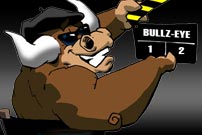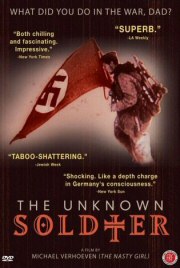 With the temperature dropping, it's time to find someone to keep you warm. Find your hookups with our online dating guide!
With the temperature dropping, it's time to find someone to keep you warm. Find your hookups with our online dating guide!
- Rated NR
- Documentary
- 2007
- DVD
Reviewed by Jeff Giles
()
hat’s the difference between killing and murder? Even when sanctioned by war, is the taking of human life ever really acceptable? And if it is, where do we draw the line?
These are the questions in the background of Michael Verhoeven’s “The Unknown Soldier,” and though most of the attention surrounding the movie has rightly focused on its incorporation of new, horrifying images from World War II’s Eastern Front, it’s those questions that are really the most thought-provoking aspects of the film. Verhoeven, best known for his 1990 film “Nasty Girl,” makes his first foray into documentary filmmaking here, following the path of the hotly contested “War of Extermination: Crimes of German Armed Forces 1941-44,” a touring exhibition that opened to enormous public outcry in Germany a decade ago. Interviewing people on both sides of the debate, Verhoeven demonstrates just how fresh human rage can be, even when the wounds were incurred 50 years ago.
Why all the outcry? It may seem like splitting hairs, but the battle over “War of Extermination” essentially boiled down to the exhibition’s position that it wasn’t only Nazi troops committing depraved acts of genocide during the war – that, in fact, the rank and file in Germany’s army (the Wehrmacht) were ready and willing to take the lives of Jewish men, women and children. This is a contention that understandably wounds the national pride of a not-insubstantial number of Germans – some of whom, but certainly not all, identify themselves with the neo-Nazis.
“War of Extermination” actually dovetailed with a lot of recent scholarly study on Germany during World War II, devoted to the utterly reasonable question of just how in the hell a country exterminates millions of people – many of them citizens of that very country – while the bulk of the population goes about its daily business. The answer varies depending on whose research you read, and is far too detailed to get into here, but the bottom line is this: people in general are far more susceptible to this kind of thing than any of us would like to believe. We don’t act like animals, most of the time, but we’re still animals at heart – and it doesn’t take much to strip us back to our roots.
As some of the historians Verhoeven interviewed for “The Unknown Soldier” point out, hatred of the Jewish people was something that had been drummed into Europeans for centuries. The Nazis were hardly unique in blaming problems on Jews – or in trying to “solve” those problems with murder. The difference here was one of scale and organization, and as “The Unknown Soldier” repeatedly drives home, the German government didn’t take a step in the war without considering how to crush a few hundred thousand Jews in the process. The eastern front was no different. In the Ukraine, for instance, troop commanders had detailed lists of each town’s Jewish population, and German planes littered the cities with leaflets detailing the supposed crimes of the Jews. The effect was similar to lighting a tinderbox with a flamethrower -- and then tossing it into a gas tank. The photos and footage of what happened next are revolting – and awfully relevant. Watch Wehrmacht soldiers grinning in front of makeshift gallows, corpses swinging in the breeze – or clubbing defenseless men in the streets, or beating naked women for fun – and you’re bound to be reminded of those pesky Abu Ghraib photos we’re supposed to have forgotten by now.
And it’s that human propensity for forgetting nasty things, really, that provides the strongest argument for “The Unknown Soldier.” A lot of people think the civil rights struggle ended in the ‘60s. There are people living in Japan who don’t know what happened on Aug. 6 and 9, 1945. People in Germany are no different from the rest of us, and many of them take just as much umbrage at exhibits suggesting their heroes had feet of blood-soaked clay; and even if they did, it was a long time ago, so why not leave it alone, right?
Wrong. Exhibits like “War of Extermination” (and films like “The Unknown Soldier”) provide painfully important reminders of how low we can sink as a species, and just how easily. Judging from the course of human events in the decades since World War II, we’re no closer to solving the darkest riddles of our nature than we’ve ever been, and it’s probably only through this type of horrific self-examination that we’ll ever be able to approach genuine progress.
Unfortunately, even given all this, “The Unknown Soldier” is a noticeably flawed film. Despite the breadth of his subject, Verhoeven has a hard time filling 90 minutes of space, and after the movie’s midway point, it starts repeating itself on a regular basis. This is partially due to the unwillingness of the exhibit’s neo-Nazi opponents to be interviewed, but even taking that into consideration, this film spends a disappointing amount of time pacing. As a historical document, it’s fascinating; as a polemic against our most terrible flaws, it’s invaluable. As a piece of filmmaking, though, it doesn’t have quite the strength its subject matter deserves. Don’t let this stop you from seeing it – just make sure you aren’t watching on a full stomach.
You can follow us on Twitter and Facebook for content updates. Also, sign up for our email list for weekly updates and check us out on Google+ as well.











